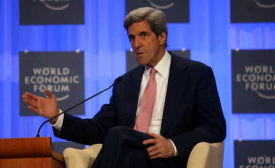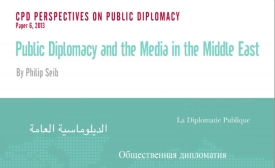public diplomacy
To mark the 50th anniversary of Martin Luther King, Jr.’s I Have a Dream speech on August 28, the networks of the Broadcasting Board of Governors will provide special programming including live reports from Washington, DC, topical original features on human rights and civil disobedience in the United States and abroad, and interviews with key figures in the U.S. civil rights movement.
Before traveling to Oman on the Kennedy-Lugar Youth Exchange & Study (YES) Program, Dylan Hoey had never left the United States. Yet through this YES Abroad experience, Dylan proved he could not only live in another country but thrive there. “I think what I’ve taken from Oman is a newfound sense of confidence,” says Dylan. “I have a clearer sense of what I want to do in my life, what I want to achieve career-wise, and what truly makes me happy.
Israel has been forced to issue a formal apology to Japan over offensive comments posted on Facebook by its head of online public diplomacy. The apology followed a complaint by the Japanese ambassador to Israel, Hideo Sato, after senior government official Daniel Seaman disparaged commemorations for the victims of the 1945 atomic bombs, causing a wave of protests in Japan.
At some point, the post-revolutionary Arab states will emerge from the self-destructive madness that has them so tightly in its grip. While Egypt, Syria, Libya, and Tunisia deal with varying degrees of instability, the future should be kept in sight. The key to an improved future in the region is less political than it is economic. Democracy is a worthy goal, but it will be reached only slowly.

At some point, the post-revolutionary Arab states will emerge from the self-destructive madness that has them so tightly in its grip. While Egypt, Syria, Libya, and Tunisia deal with varying degrees of instability, the future should be kept in sight.

The newest CPD Perspectives is authored by CPD's Former Director Philip Seib, titled "Public Diplomacy and the Media in the Middle East." The paper analyzes the ways and means of engaging the region through various forms of media.
Watching the events unfold in Egypt over the past weeks has been akin to watching a slow moving train wreck as two powerful forces – the army and the Muslim Brotherhood – collide together. Both have strong wills, resources, and high stakes in the outcome. Whereas social media played a pivotal role in uniting the Egyptian public during the January 25 revolution in 2011, it appears that mass media may be playing the critical role in dividing the Egyptian public during the current events.
A collaboration between USC Annenberg, the David and Dana Dornsife College and Price School of Public Policy sent a group of USC students to study shifting political, social and economic landscapes in Cuba for the second consecutive summer. Under the direction of Journalism Professor Roberto Suro and USC Dornsife Professor Pamela Starr, 25 students from an array of disciplines — public relations, public diplomacy, specialized journalism, strategic communications and international relations — spent one month immersed in research and investigation of all things Cuba.







